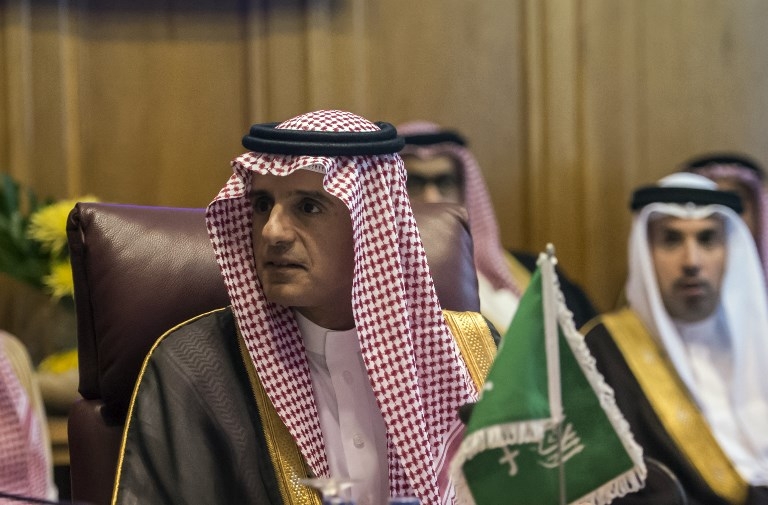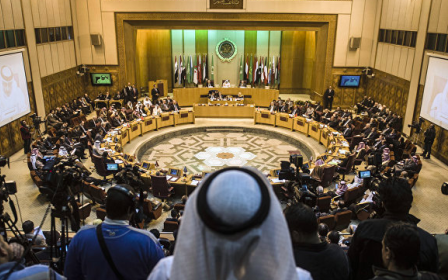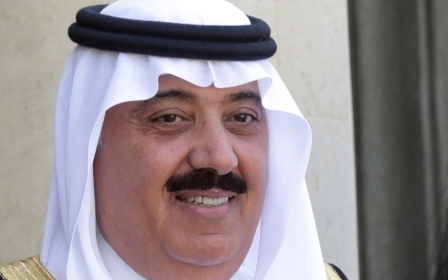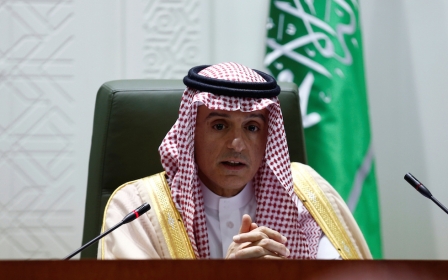Saudi Arabia warns it will not tolerate 'aggression' by Iran

Saudi Arabia warned on Sunday that it would not stand idly by in the face of Iranian "aggression," as Bahrain said the Iran-backed Hezbollah movement was "in total control" of Lebanon.
The foreign ministers of both Gulf states spoke at an extraordinary general meeting of the Arab League at its Cairo headquarters, called by Riyadh.
An Iranian foreign ministry official quickly dismissed the meeting as "worthless" on Monday, saying many of the region's problems were down to Saudi Arabia's "sterile policy".
The Arab League meeting was held as regional tensions have risen in recent weeks between Saudi Arabia and Iran over Lebanese Prime Minister Saad al-Hariri’s surprise resignation and after an escalation in Yemen’s conflict.
For decades, Saudi Arabia and Iran have stood on opposing sides of conflicts in the Middle East, including in Syria and Yemen.
Saudi Foreign Minister Adel al-Jubeir warned Iran that Riyadh will not stand idle in the face of Iranian "aggression".
Saudi Arabia "will not hesitate to defend its national security to keep its people safe," Jubeir said in opening remarks at the meeting.
"I trust the League's council will take on its responsibility and take a decision regarding Iranian violations of Arab security," he said ahead of Sunday's talks.
Bahrain's foreign minister, Sheikh Khalid bin Ahmed al-Khalifa, said the Shia Hezbollah movement in Lebanon was "in total control" of the country.
"Iran's biggest arm in the region at the moment is the terrorist Hezbollah arm," he said.
He added that Hezbollah "does not just carry out operations inside the borders of [Lebanon], it also crosses its borders to all of our nations," making it "a threat to Arab national security".
He called on countries "where Hezbollah is a partner in government to carry their responsibility".
"The Lebanese Republic, in spite of our relations with it as a brotherly Arab nation... is under the total control of this terrorist party," Sheikh Khalid said.
Hezbollah in 'control'
For more than a decade, Lebanon's political class has been largely split between Iran-backed Hezbollah and its allies, and a Saudi-supported coalition led by Hariri.
In Syria, Hezbollah has fought to defend the government of President Bashar al-Assad, also an ally of Iran.
Hezbollah, both a military force and a political movement, is part of a Lebanese government made up of rival factions, and an ally of Lebanese President Michel Aoun.
Aoun has accused Saudi Arabia of holding Hariri hostage. Senior Lebanese politicians close to Hariri also said he was coerced into resigning. Saudi Arabia and Hariri both deny those accusations.
"What Iran is doing against some Arab countries calls for taking more than one measure to stop these violations, interferences and threats, which are carried out through many various means," Hossam Zaki, Arab League assistant secretary, told Asharq al-Awsat newspaper in an interview.
"Stopping them requires a joint Arab policy."
He said the meeting would send a "strong message" for Iran to step back from its current policies.
Egypt's state-owned newspaper Al-Ahram cited an Arab diplomatic source saying the meeting may refer the matter to the United Nations Security Council.
On Monday, Iranian foreign ministry spokesman Bahram Ghassemi was quoted by the ISNA news agency saying the Arab League's accusations were "untrue" and urged Saudi Arabia to "immediately stop its savage aggression against the Yemeni Arab people" and "stop its pressure on Lebanon, Qatar and the entire region".
He accused Riyadh of "following the policy of the Zionist regime... that seeks to divert attention from the main issue, namely the occupation of Palestine".
Response to 'aggression'
The emergency Arab foreign ministers meeting was convened at the request of Saudi Arabia with support from the UAE, Bahrain, and Kuwait to discuss means of confronting Iranian intervention, Egypt's state news agency MENA said.
Saudi Arabia's Jubeir told Reuters last week that the kingdom's actions in the Middle East were only a response to what he called the "aggression" of Iran.
Iran has hit back over the accusations, with its foreign minister saying Riyadh was responsible for the problems in the region.
"Unfortunately countries like the Saudi regime are pursuing divisions and creating differences and because of this they don't see any results other than divisions," Iranian Foreign Minister Mohammad Javad Zarif told Iranian state media on Sunday on the sidelines of a meeting in Antalya with his Russian and Turkish counterparts about the Syria conflict.
Lebanon's state-run NNA media said the country's foreign minister would not attend the Cairo meeting. Lebanon would be represented by its representative to the Arab League, Antoine Azzam, it said.
After French intervention, Hariri flew to France and met French President Emmanuel Macron in Paris on Saturday.
Speaking in Paris, Hariri said he would clarify his position when he returns to Beirut in the coming days. He said he would take part in Lebanese independence day celebrations, which are scheduled for Wednesday.
Later on Sunday, Hariri tweeted that he plans to stop in Egypt on Tuesday for talks with Egyptian President Abdel Fattah al-Sisi.
Saudi Arabia also accuses Hezbollah of a role in launching a missile at Riyadh from Yemen earlier this month. Saudi Arabia's Crown Prince Mohammed bin Salman said Iran's supply of rockets to Houthi militias was an act of "direct military aggression".
Yemen's civil war pits the internationally recognised government, backed by Saudi Arabia and its allies, against the Houthis and forces loyal to former president Ali Abdullah Saleh. Iran denies charges it supplies Houthi forces.
Middle East Eye propose une couverture et une analyse indépendantes et incomparables du Moyen-Orient, de l’Afrique du Nord et d’autres régions du monde. Pour en savoir plus sur la reprise de ce contenu et les frais qui s’appliquent, veuillez remplir ce formulaire [en anglais]. Pour en savoir plus sur MEE, cliquez ici [en anglais].




